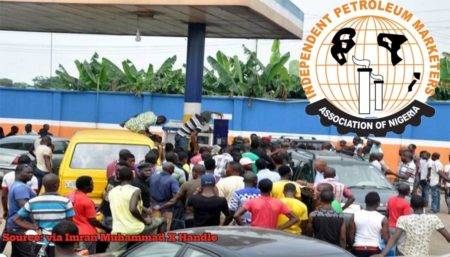The Independent Petroleum Marketers Association of Nigeria (IPMAN) anticipates an extended duration of the prevailing petrol shortage, enveloping a growing list of states nationwide, estimating its persistence for around two weeks. Despite reassurances from the Nigerian National Petroleum Company Limited (NPCL) regarding the sufficiency of petrol supply in the country, Chinedu Ukadike, the Public Relations Officer of IPMAN, attributes the ongoing scarcity to procurement hurdles intensified by refinery maintenance endeavors in Europe. This forecast underscores the pressing need for strategic interventions to mitigate the impacts of external factors on Nigeria’s fuel supply chain.
As IPMAN delineates the potential timeline for the protracted petrol shortage, stakeholders in Nigeria’s energy sector are prompted to devise proactive measures to address the underlying challenges. With the backdrop of NPCL’s assertions contrasting IPMAN’s projections, the discourse highlights the imperative for transparent communication and collaborative efforts to navigate through the complexities of the fuel distribution ecosystem. Moreover, elucidating the interplay between international refinery activities and domestic fuel availability underscores the interconnectedness of global energy markets and emphasizes the need for resilient strategies to safeguard Nigeria’s energy security amidst external disruptions.
IPMAN Says Supply Chain Disruptions Cause Scarcity and Queue Build-up
In a recent interview, renowned economist Ukadike delves into the current fuel scarcity gripping Nigeria, attributing it to the absence of petroleum products exacerbated by disruptions in the international supply chain. With long queues forming at filling stations nationwide, Ukadike highlights logistical and vessel issues raised by NPCL, indicating the severity of the situation. He stresses the reliance on imports as a contributing factor, particularly amidst ongoing maintenance at European refineries, further straining the supply chain. Despite reassurances from NPCL, Ukadike underscores the critical importance of timely vessel arrivals to alleviate the crisis and restore normalcy to the fuel distribution system.
With Nigeria grappling with persistent fuel scarcity, Ukadike’s insights shed light on the complexities of the issue, emphasizing the urgent need for strategic measures to mitigate disruptions in the international supply chain. As the nation navigates through this challenging period, Ukadike underscores the significance of addressing underlying logistical and maintenance challenges to ensure a sustainable and reliable fuel supply for its citizens. Through collaborative efforts between stakeholders and proactive measures to strengthen domestic refining capacity, Nigeria can move towards a more resilient energy infrastructure, reducing its vulnerability to external disruptions and safeguarding against future fuel shortages. and Market Dynamics
The reassurances from NPCL’s Group CEO regarding upcoming vessel arrivals signify efforts to mitigate the ongoing crisis. However, Ukadike pointed out that challenges persist for marketers, particularly concerning license renewals. He noted NNPC’s decision to shut its portal for marketers unable to renew licenses, further exacerbating the scarcity. The stringent requirements for license renewal imposed by the Nigerian Midstream and Downstream Petroleum Regulatory Authority (NMDPRA) have contributed to the hostile environment faced by marketers.
IPMAN Declares Licensing Issues Exacerbate Scarcity Despite Supply Assurances
Ukadike, the Public Relation Officer of IPMAN, has shed light on a significant incongruity between the figures listed on NNPC’s portal and the actual number of marketers who successfully renewed their licenses. With a total of 15,000 marketers registered, only a mere 1,050 were able to navigate the renewal process successfully. This glaring disparity underscores the formidable challenges inherent in the license renewal procedures. Moreover, the looming deadline of April 15, stipulated by NNPC for license renewal, has exacerbated the situation, prompting IPMAN to advocate for an extension to alleviate the mounting pressure on marketers.
IPMAN has further emphasized the urgent need for the Nigerian Midstream and Downstream Petroleum Regulatory Authority (NMDPRA) to streamline the issuance of licenses for marketers who have diligently completed all requisite procedures. With delays in the release of licenses exacerbating the already arduous renewal process, IPMAN’s call for swift action from NMDPRA aims to alleviate the burden on marketers and ensure a smoother regulatory framework moving forward. By addressing these pressing concerns, both NNPC and NMDPRA can foster a more conducive environment for the petroleum industry, facilitating the seamless operation of marketers and safeguarding against unnecessary disruptions.
IPMAN Appeals for Deadline Extension and Reduction of Licensing Bottlenecks
Amidst the backdrop of persistent scarcity and regulatory hurdles, the Independent Petroleum Marketers Association of Nigeria (IPMAN) makes a compelling plea to the Nigerian National Petroleum Corporation (NNPC) for an extension of the renewal deadline. This appeal seeks to offer respite to marketers grappling with the complexities of meeting stringent requirements amidst ongoing challenges. By extending the renewal deadline, NNPC can facilitate a more manageable transition for marketers, thereby fostering stability within the petroleum distribution ecosystem.
Furthermore, IPMAN urges the Nigerian Midstream and Downstream Petroleum Regulatory Authority (NMDPRA) to undertake measures aimed at streamlining the licensing process. Simplifying these procedures would alleviate bottlenecks that hinder marketers’ access to essential petroleum products. By enhancing the efficiency of licensing procedures, NMDPRA can contribute significantly to mitigating the current crisis and fostering a more seamless operation within the petroleum distribution sector, ultimately benefiting both industry stakeholders and consumers alike.
Collaboration Needed to Overcome Petrol Shortage Challenges
In the wake of Nigeria’s persistent petrol shortage, a call for collaboration echoes louder than ever. Regulatory bodies, petroleum marketers, and industry stakeholders must unite in a concerted effort to navigate through this crisis. By fostering a collaborative environment, addressing licensing challenges, and optimizing the supply chain, the nation can take significant strides towards resolving the ongoing petrol scarcity and stabilizing its distribution network.
Streamlining processes and enhancing coordination among key players are pivotal in expediting the resolution of this crisis. The forecasted two-week timeline by IPMAN could materialize into a tangible solution with strategic interventions and effective measures in place. As Nigeria endeavors to overcome this challenge, prioritizing collaboration and proactive initiatives will be instrumental in delivering much-needed relief to both motorists and consumers, thereby restoring faith in the nation’s petroleum distribution system.
Table of Contents
Discover more from OGM News NG
Subscribe to get the latest posts sent to your email.














